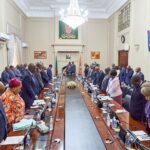Nkana Member of Parliament, Binwell Mpundu, has urged Zambia’s youth to unite and become the driving force for the change they wish to see in the country. In a passionate address broadcast across various social platforms at the start of the year, Mpundu laid out his vision for a new initiative aimed at empowering young Zambians to take control of their destinies and lead the country toward a brighter future.
The initiative, named the “Movement for Good Governance,” or Ichabaiche, is a platform Mpundu believes will galvanize the youth to aspire to leadership positions. He emphasized that young people must take an active role in shaping the political and social landscape of Zambia if the nation is to make meaningful progress.
During his address, Mpundu expressed deep concerns over the erosion of democratic principles in Zambia, specifically calling attention to the selective application of justice. He pointed to a recent incident in which a cabinet minister made derogatory remarks about an ethnic group without facing any repercussions, while others with similar offenses were subjected to harsh punishment. For Mpundu, this inconsistency in justice further fuels the need for change in the country.
Drawing inspiration from the youth of Senegal, who rallied behind 44-year-old Bassirou Diomaye Faye and voted for someone from their own ranks, Mpundu called on Zambian youth to emulate this spirit of collective action and take a stand for their future. He sees the young people of Senegal as exemplifying the kind of proactive change that Zambia desperately needs today.
In his address, the Nkana MP underscored that it is time for young people to rise and reshape the country’s future. He invited them to unite under the banner of Ichabaiche and seek leadership roles that will not only empower them but also address the systemic issues undermining the nation’s progress.
However, Mpundu’s call for unity and action has not been universally received. Some critics, including a few members of the public, have voiced concerns over the authenticity of his intentions, questioning the effectiveness of his movement. One commenter pointed out that many Zambians, particularly the youth, are already benefiting from government initiatives like the empowerment programs and improved access to education. Others criticized Mpundu for not offering tangible solutions to the youth’s challenges and suggested that his political motives may be clouding his message.
While these criticisms reflect the political tension in Zambia, Mpundu’s address has undoubtedly sparked conversation about the future of Zambia’s youth in politics and governance. His call for unity and engagement with the current political system remains a critical point of discussion as the country continues to navigate its path toward sustainable development.
As Zambia faces a rapidly changing political and social climate, the involvement of its youth in leadership roles will be pivotal in determining the nation’s future direction. Whether the “Movement for Good Governance” will gain traction remains to be seen, but it has certainly laid the groundwork for an important dialogue on youth leadership and democracy in Zambia.






